Press and News Innovation challenge spark ideas to solve post-harvest losses in Senegal
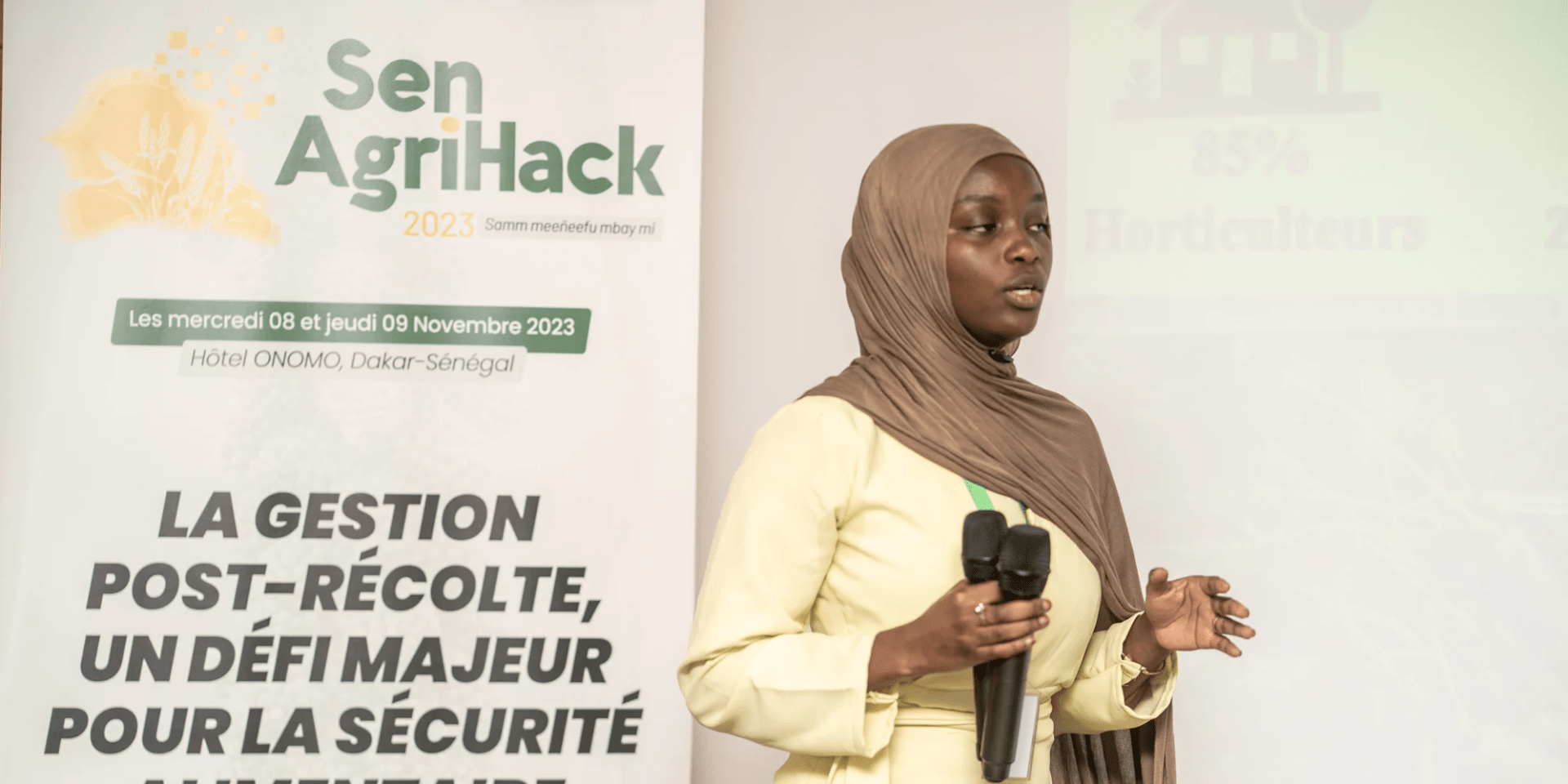
More than 250 people—many of whom were women and youth—recently gathered in Dakar, Senegal to participate in the inaugural SenAgriHack, a two-day collaborative event for stakeholders in the country’s agriculture sector hosted by AICCRA, CGIAR Hub for Sustainable Finance, CGIAR Accelerate for Impact Platform and Haskè Ventures.
By: Marie Ena Derenoncourt and Héloïse Barret Dia
Senegal faces post-harvest losses which affect somewhere between 12 to 40 percent of GDP, and often result in annual financial losses of around USD 167 million.
Post-harvest losses in cereals, protein crops, and horticulture have a direct impact on the country's food and economic sovereignty, and occur at various stages of the agricultural value chain.
When it comes to horticulture for instance, on average, 30% of vegetable production is lost on the farm and therefore never reaches the stage of sale or consumption.
Eliminating these losses could increase the total value of vegetable supply by 45% (equivalent to USD 72 million) per year and reduce annual vegetable imports by 22%.
Post-harvest losses have been identified as a common challenge in Climate Smart Investment Plans (CSAIP) that have been co-developed in partnership with local stakeholders and decision makers.
The CSAIPs, through science-based evidence, identify concrete actions governments can take to boost climate-smart agriculture, both in the form of investment opportunities and policy design and implementation.
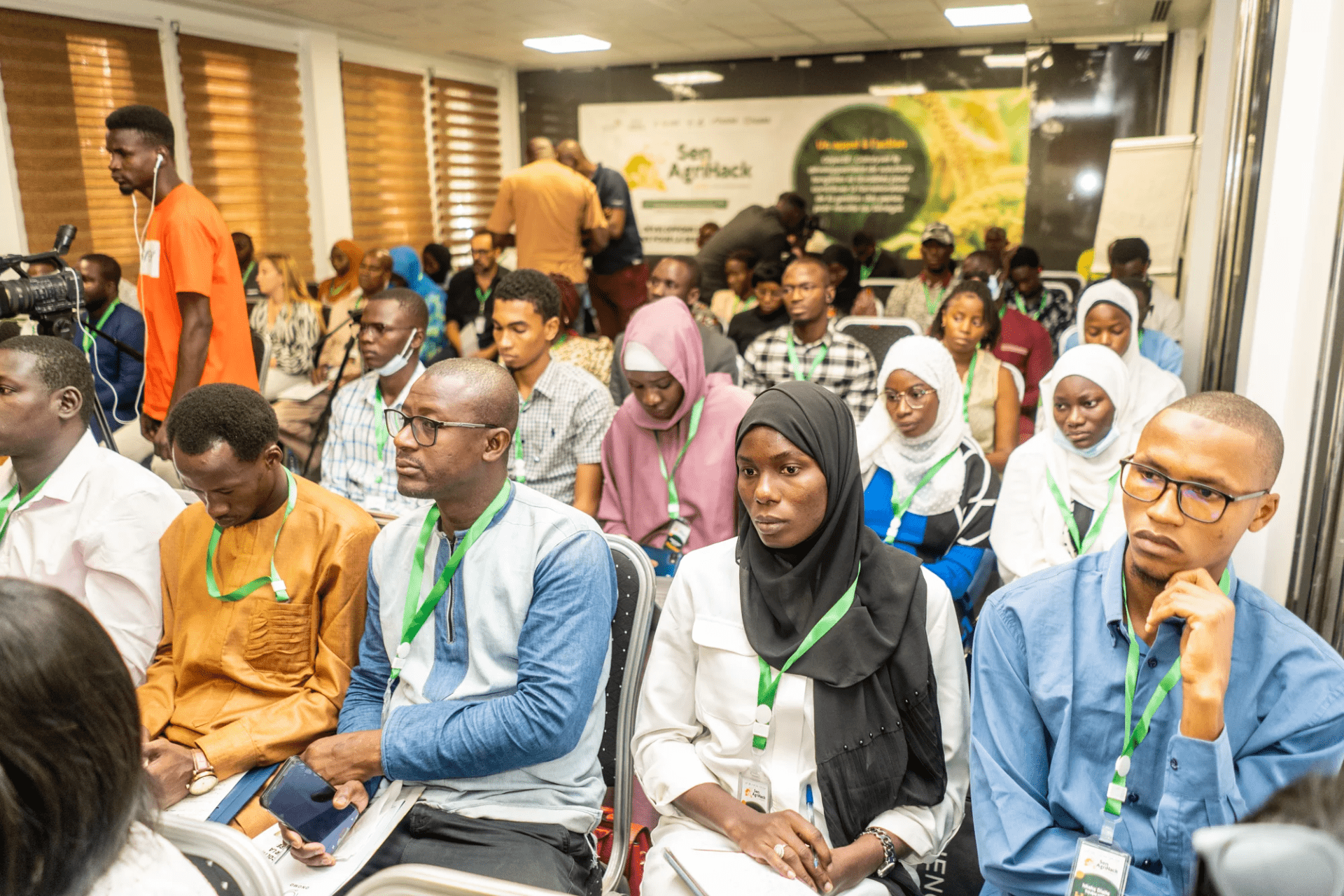
Attendees at SenAgriHack 2023.
The 2023 Senegal Agri-Hackathon (SenAgriHack 2023) was recently hosted in Dakar to create a multisectoral dialogue between stakeholders to explore opportunities to address post-harvest losses.
A key objective was to make research and innovation more accessible to farmers and other value chain stakeholders, and encourage the adoption relevant innovations at scale to bolster climate change adaptation, resilience, and food security.
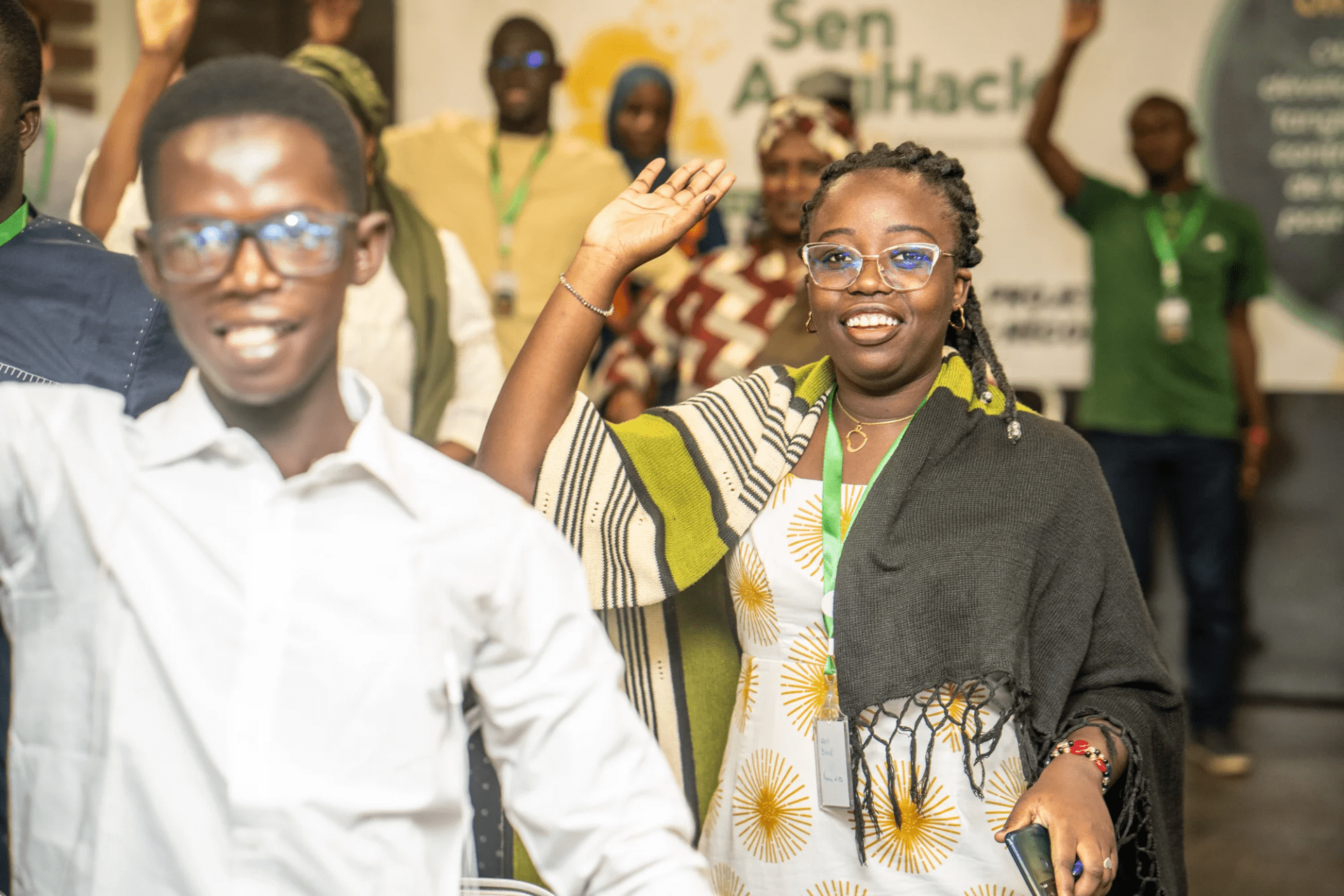
Connecting research to action through collaboration
The young men and women who participated in the SenAgriHack public event on 8-9 November 2023 were highly motivated to become changemakers in the fight against climate change.
The 'hackers' came from farmer organizations, processors, agri-corporates, food distribution companies, agri-tech innovation startups, and financial institutions.
Half of the participants came from the capital Dakar, but many had travelled from rural areas to contribute to the conversation about post-harvest losses in the context of the challenges their communities are facing.
By breaking down traditional silos and integrating the perspectives of many stakeholders, SenAgriHack 2023 fostered an enabling environment to identify which parts of the agricultural supply and value chains that need improved post-harvest management and how.
Speakers at the event provided actionable recommendations and strategies that participants could implement:
- Inclusive project design: Policy focused on incentivizing and guiding agricultural project developers to integrate gender perspectives systematically into their designs, ensuring inclusivity and addressing specific needs and constraints faced by women.
- Supply chain regulation: The development of regulations or incentives encouraging structured supply chain management practices, emphasizing the reduction of post-harvest losses through efficient logistics and distribution.
- Education of farmers on basic digital skills: Access to basic digital knowledge for all farmers and professionals in agriculture is a pre-requisite for the adoption of digital technologies, data analytics to optimize post-harvest processes.
- Market information system: To provide safeguards in the agricultural sector, updated regularly with robust data that help anticipate shocks and enable the implementation of efficient post-harvest management processes.
- Incentives for modernization: Incentives encourage the adoption of innovative technologies and sustainable solutions to reduce post-harvest losses.
Gender and social inclusion was a key goal for SenAgriHack 2023, requiring that hackers’ solutions demonstrated a gender-sensitive approach to climate change, promoting climate-smart and gender-smart models that should be included in the solutions.
Gender was highlighted both in the selection criteria for the finalists and in the evaluation of the solutions proposed by the hacker teams, and the solutions presented during the hackathon were either from women-led initiatives and/or included gender-responsive aspects that addressed challenges faced by women in agricultural value chains.
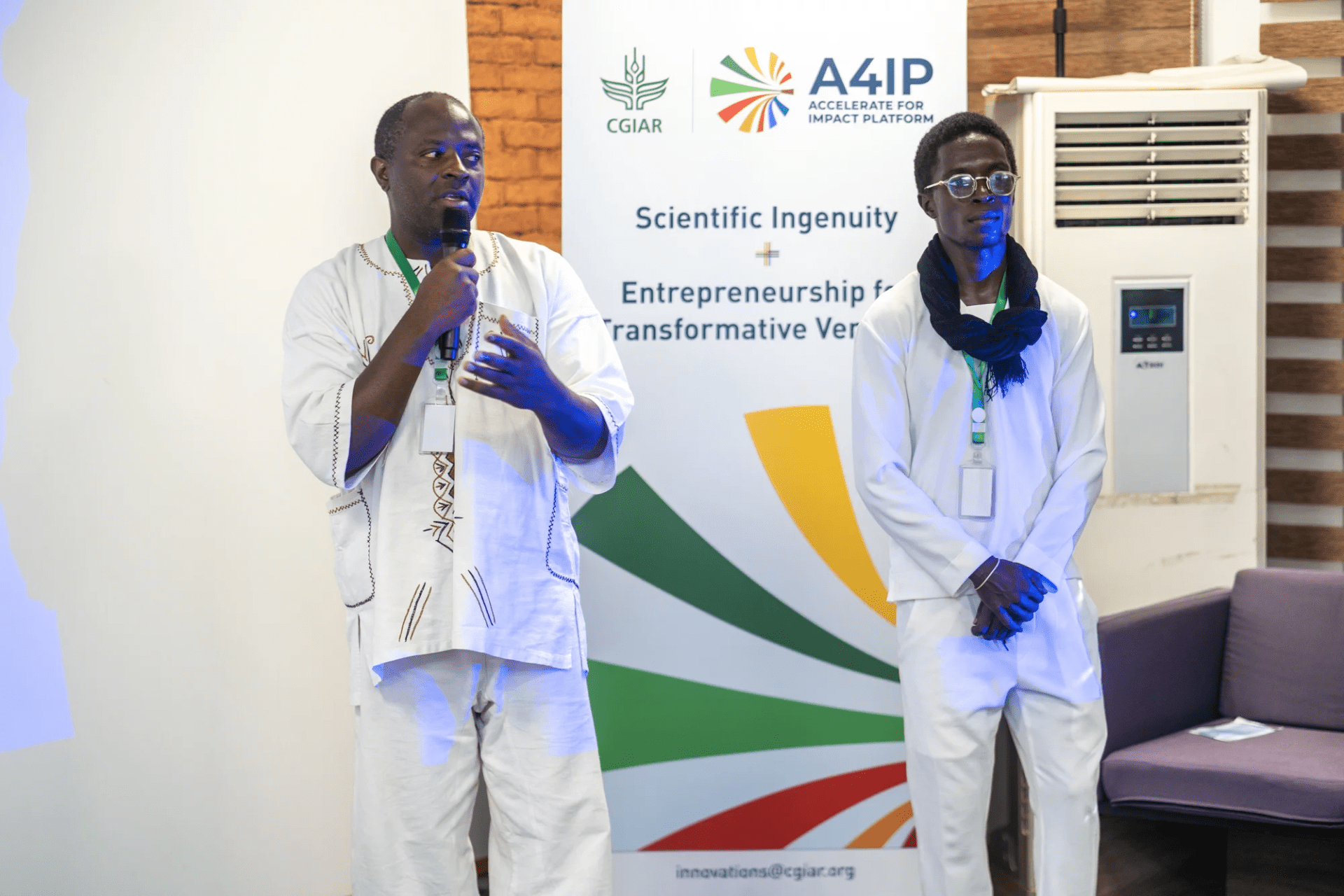
One of the finalists makes his pitch.
Hackathon outcomes
The SenAgriHack 2023 came after coaching workshops and networking sessions which whittled down 183 applicants down to 18, with the finalists were invited to present to an expert jury for assessment to choose three winners.
The teams were coached by mentors including researchers from Accelerating Impacts of CGIAR Climate Research for Africa (AICCRA) and the broader CGIAR partnership, alongside experts from partner organizations (from the public and private sectors) who shared their expertise to ensure that proposed innovations would be climate-smart, gender-smart, scalable and commercially viable.
Proposed solutions included market linkage improvements, improvement of processing and conservation, storage infrastructure, use of artificial intelligence for early detection of production and storage failures, use of solar energy to enhance post-harvest management, as well as innovative packaging materials.

The panel of expert judges.
SenAgriHack 2023 winners
The three winners were:
- FIRST PLACE | Aar Sunu Soblé spearheaded by three young women Aïssatou Djigo, Ndèye Maïmouna Ndour and Coumba Thiaw Leye who shared an innovative solution to manufacture and commercialize cotton fibers and millet stalk powder bags, offering an environmentally friendly alternative to polypropylene bags. The bags feature thermal insulation and light-barrier properties thanks to the cotton, and dehydrating properties thanks to the millet stalk powder. The novel use of millet stalks, rich in silica, represents a significant advance in onion bulb preservation.
- SECOND PLACE | Fawru Remobe led by Khady Diagne and Yaya Sow for an innovative solution of bioclimatic earth and clay storage granaries for the sustainable conservation of onions. The solution offers a long storage life ranging from three to five months, being able to store produce at 15° lower than the ambient outside temperature.
- THIRD PLACE | SEN TRANS'INNOV led by Seynabou Ciss and Ishaka Diallo focused on transforming local natural products into nutritious food bars. By combining peanuts, dehydrated mango, baobab powder, moringa powder, and honey, this project provides an effective response to losses in the cereal, protein, and horticultural value chains.
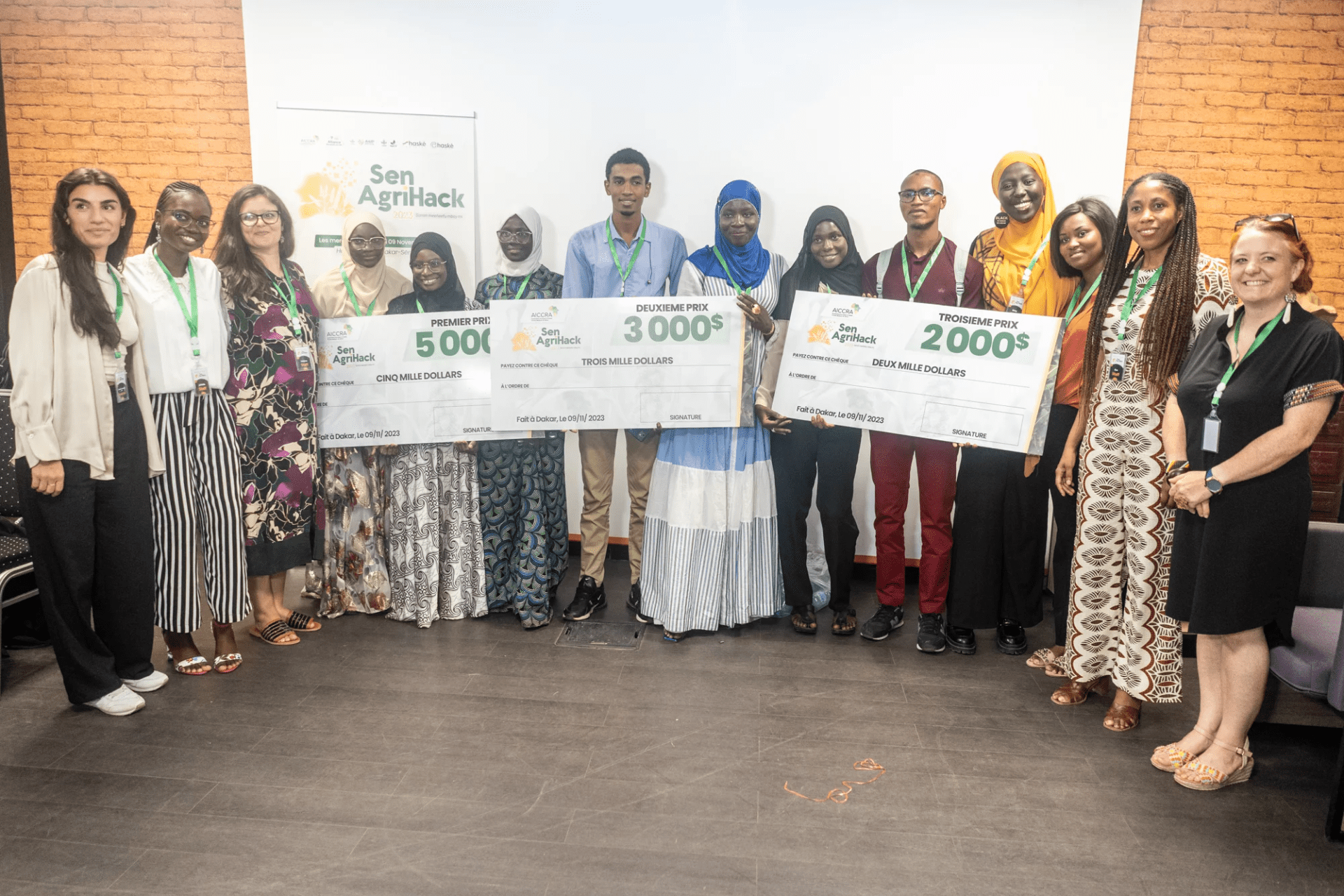
The three winners Aar Sunu Soblé, Fawru Remobe, and SEN TRANS'INNOV alongside judges and hosts
Seynabou Ciss from SEN TRANS’INNOV said:
‘’Our participation at SenAgriHack was pivotal because we have received targeted mentorship from experts to finalize our value proposition and identify the scaling approach for our innovation. SenAgriHack mobilized a collaborative ecosystem, showing the role each actor can play in addressing the challenges faced by the agricultural sector today.
We were happy to listen to the other pitches to better understand the wide range of solutions applicable to post-harvest losses stemming from the young people in Senegal. We think that events like SenAgriHack are essential to catalyze relevant, tangible and sustainable solutions.
They also create a platform giving exceptional visibility to innovative ideas that favour a collaborative approach between diverse actors from the agricultural sector. Our next step will be to refine our solution based on the feedback from the jury, the advice of our mentors and the comments from our fellow hackers. This will put us a in a better position to seek partners and financing options to accelerate the scaling of Sen Trans’Innov.”
Lessons learned
The hackathon was an excellent entry point to gather engaged and enthusiastic actors to identify, assess and support a pipeline of context-relevant solutions to climate change. While many excellent ideas were presented, they are at the ideation phase. Downstream incubation and acceleration programs are necessary to validate and scale these innovations.
Youth-led climate initiatives have an entrepreneurial spirit. The SenAgriHackers aim to launch sustainable businesses through green technologies and implementation of climate-smart practices. This entrepreneurial approach can contribute to economic growth with positive environmental impact
While they face climate change impacts differently, farmers and value chain actors are eager to participate in a dialogue to unlock solutions that are relevant for everyone. Opportunities like SenAgriHack offer a collaborative space to bridge the gaps between sectors and to maximise where there may be opportunities to learn from and support each other.
Public actors can leverage innovations generated by stakeholders to formulate policies that cultivate an enabling environment for tangible, inclusive, and climate-smart solutions.
Media coverage in Agence de presse sénégalaise
Marie Ena Derenoncourt talks to Agence de presse sénégalaise at SenAgriHack 2023

Ena Derenoncourt
Gender-Smart Investment Specialist, CGIAR Hub for Sustainable Finance (ImpactSF)What’s next?
The Senegalese Youth and Women Entrepreneurship Office (DER/FJ) invited the SenAgriHack winners to showcase their innovation at an event that was part of the 2023 Global Entrepreneurship Week.
The winners were also invited to submit their proposal to the BE YES Incubation program financed by MasterCard Foundation.
Representatives from The World Bank and the Luxembourg Development Cooperation (LuxDev) expressed their commitment at the project’s virtual event. And with AICCRA's support, relevant hackathon winners are being linked with regional initiatives such as World Bank’s Food System Resilience Program (FSRP) and LuxDev’s LuxAid Challenge Fund to access more support to further develop and scale the ideas from the hackathon.
